CRAMER'S RULE OF SOLVING SIMULTANEOUS EQUATIONS
Let us consider the following system of three equations with three unknowns x, y and z.
a11x + a12y + a13z = b1
a21x + a22y + a23z = b2
a31x + a32y + a33z = b1
Now, we can write the the following determinants using the above equations.
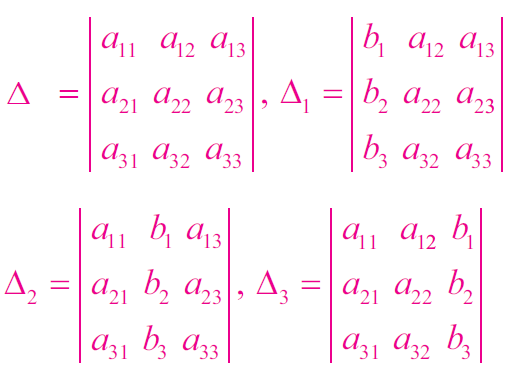
Then, Cramer’s rule to find the values of x, y and z :
x = Δ1/Δ
y = Δ2/Δ
z = Δ3/Δ
If Δ = 0, the system is inconsistent and it has solution.
Example 1 :
Solve the following system of linear equations using Cramer’s rule:
5x − 2y + 16 = 0
x + 3y − 7 = 0
Solution :
5x − 2y = -16 ------(1)
x + 3y = 7 ------(2)
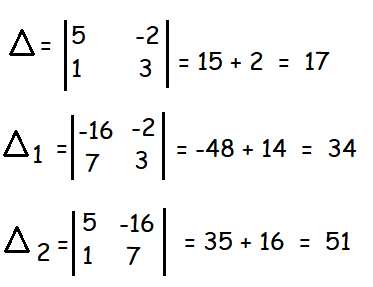
By Cramer's rule,
x = Δ1/Δ = -34/17 = -2
y = Δ2/Δ = 51/17 = 3
So, the values of x and y are 2 and 3 respectively.
Example 2 :
Solve the following system of linear equations using Cramer’s rule :
(3/x) + 2y = 12
(2/x) + 3y = 13
Solution :
Let 1/x = x1.
Then,
3x1 + 2y = 12
2x1 + 3y = 13
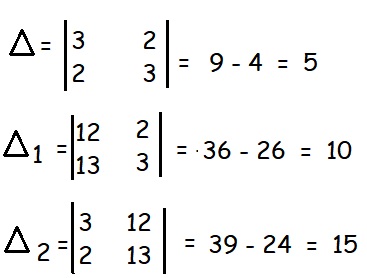
By Cramer's rule,
x1 = Δ1/Δ = 10/5 = 2
1/x = 2 -----> x = 1/2
y = Δ2/Δ = 15/5 = 3
So, the values of x and y are 1/2 and 3 respectively.
Example 3 :
Solve the following system of linear equations using Cramer’s rule :
3x + 3y − z = 11
2x − y + 2z = 9
4x + 3y + 2z = 25
Solution :
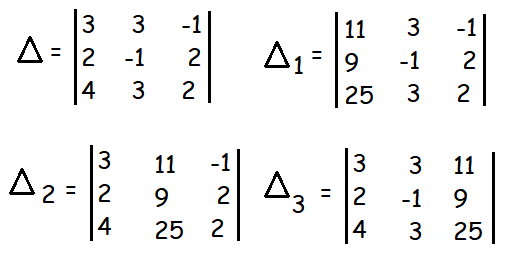
Δ = 3(-2-6) - 3(4-8) - 1(6+4)
= 3(-8) - 3(-4) - 1(10)
= -24 + 12 - 10
= -34 + 12
= -22
Δ1 = 11(-2-6) - 3(18-50) - 1(27+25)
= 11(-8) - 3(-32) - 1(52)
= -88 + 96 - 52
= -140 + 96
Δ1 = -44
Δ2 = 3(18 - 50) - 11(4 - 8) - 1(50 - 36)
= 3(-32) - 11(-4) - 1(14)
= -96 + 44 - 14
= -110 + 44
Δ2 = -66
Δ3 = 3(-25 - 27) - 3(50 - 36) + 11(6 + 4)
= 3(-52) - 3(14) + 11(10)
= -156 - 42 + 110
= -198 + 110
Δ3 = -88
By Cramer's rule,
x = Δ1/Δ = -44/(-22) = 2
y = Δ2/Δ = -66/(-22) = 3
z = Δ3/Δ = -88/(-22) = 4
So, the values of x, y and z are 2, 3 and 4 respectively.
Example 4 :
Solve the following system of linear equations using Cramer’s rule :
(3/x) - (4/y) - (2/z) - 1 = 0
(1/x) + (2/y) + (1/z) - 2 = 0
(2/x) - (5/y) - (4/z) + 1 = 0
Solution :
Let 1/x = a, 1/y = b and 1/z = c
3a - 4b + 2c = 1 -----(1)
a + 2b + c = 2 -----(2)
2a - 5b - 4c = -1 -----(3)
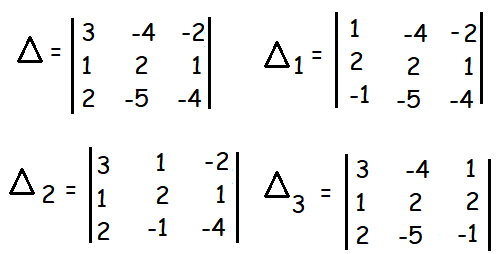
Δ = 3(-8+5) + 4(-4-2) - 2(-5-4)
= 3(-3) + 4(-6) - 2(-9)
= -9 - 24 + 18
Δ = -15
Δ1 = 1(-8+5) + 4(-8+1) -2(-10+2)
= 1(-3) + 4(-7) - 2(-8)
= -3 - 28 + 16
Δ1 = -15
Δ2 = 3(-8+1) - 1(-4-2) - 2(-1-4)
= 3(-7) - 1(-6) - 2(-5)
= -21 + 6 + 10
= -21 + 16
Δ2 = -5
Δ3 = 3(-2+10) + 4(-1-4) + 1(-5-4)
= 3(8) + 4(-5) + 1(-9)
= 24 - 20 - 9
= -5
Δ3 = -5
By Cramer's rule,
a = Δ1/Δ = -15/(-15) = 1
b = Δ2/Δ = -5/(-15) = 1/3
c = Δ3/Δ = -5/(-15) = 1/3
Then,
x = 1/a = 1/1 = 1
y = 1 / (1/3) = 3
z = 1 / (1/3) = 3
So, the values of x, y and z are 1, 3 and 3 respectively.
Kindly mail your feedback to v4formath@gmail.com
We always appreciate your feedback.
©All rights reserved. onlinemath4all.com
Recent Articles
-
Digital SAT Math Problems and Solutions (Part - 150)
Apr 25, 25 11:46 AM
Digital SAT Math Problems and Solutions (Part - 150) -
AP Calculus AB Problems with Solutions (Part - 19)
Apr 24, 25 11:10 PM
AP Calculus AB Problems with Solutions (Part - 19) -
AP Calculus AB Problems with Solutions (Part - 18)
Apr 24, 25 11:06 PM
AP Calculus AB Problems with Solutions (Part - 18)
